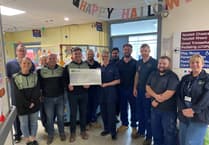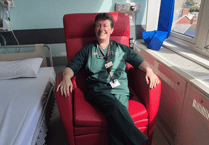A report into a west Wales hospital has shown that patients are not always receiving safe care, despite staff's best efforts.
In a report published today (Friday), the Healthcare Inspectorate Wales, says it found overcrowding and significant pressure within the emergency department at Glangwili General Hospital in Carmarthen.
The inspection concluded that despite staff efforts, patients were not consistently receiving safe care.
Inspectors found staff were working extremely hard to provide good quality care for patients, at a time when the service was under considerable pressure.
However, inspectors identified a number of improvements were needed, some of which required immediate action to be taken by the health board.
HIW completed an unannounced inspection of the emergency department on three consecutive days in December 2022. During the onsite inspection, HIW identified areas where the pressure and challenges within the department and the wider hospital were leading to an increased risk to patients.
When asked, patients and carers told inspectors they were generally satisfied with the service they had received, and inspectors witnessed staff treating patients with respect and courtesy.
However, patients expressed frustration with waiting times and the lack of updates on their care and treatment.
Significant challenges with maintaining patient flow through the hospital, meant patients were required to wait in the emergency unit for extensive periods.
There was overcrowding and a lack of toilet and washing facilities within the unit, patients were waiting in non-designated areas of the unit including outside cubicles, which did not have privacy curtains or screens to separate them from other patients.
This was having a negative impact on the ability of staff to maintain patients’ privacy, dignity, and to follow infection prevention and control procedures.
While there was a Paediatric Care and Assessment Unit (PACU), there were still delays in children being seen.
This meant children were sometimes required to wait in the main waiting area, which was unsuitable for them.
Some patients told inspectors they had to sleep on chairs or the floor for long periods.
Despite adequate arrangements in place to assess and monitor patients arriving by ambulance, we were not always assured that patients self-presenting to the unit were being triaged in a timely manner.
Inspectors added that they were also not assured patients within the waiting room were being regularly reassessed, as there was not always evidence of the triage nurse reviewing their records.
However, it was noted that patient records were easy to navigate, handwritten entries were legible and logically set out.
The report adds: "Generally, we saw medicines were safely managed in the unit, however, inspectors found storerooms were not secured to prevent unauthorised access.
"This may have presented a risk to patients or other persons gaining access.
"Checks of resuscitation equipment trolleys were not always being recorded, and therefore we were not assured necessary equipment was ready or available to be used in the event of an emergency.
"The health board must take suitable action to improve staff compliance with mandatory training to improve such matters."
Inspectors did say there was a suitable management structure in place with clear lines of reporting, and staff were generally positive about their immediate line managers.
HIW concluded that the health board has produced a comprehensive plan with detailed actions on how improvements will be made within the emergency department.
Chief Executive of HIW, Alun Jones said: "The pressure on NHS services continues to be extraordinarily high and as in other Emergency Department inspections we have undertaken, we have again found evidence of a service struggling to meet demand and to maintain patient safety with the resources available.
"I acknowledge the hard work and dedication of staff within this service, and our report provides an opportunity to highlight the challenges that patients and staff within this service are facing on a daily basis.
"The specific recommendations for action we have set out will support the health board to reduce risks to patients and staff whilst they continue to deal with this challenging period. We will continue to engage with Hywel Dda University Health Board to ensure progress against our findings."
In response to the report, Andrew Carruthers, Director of Operations at Hywel Dda University Health Board, said: “We are pleased that the dedication and hard work of our staff is reflected in the findings of HIW inspection team.
"While the report states that generally patients and carers were satisfied with the service they had received at the Emergency Department at Glangwili Hospital, we do, however, recognise that there are significant challenges within the Department.
"We also recognise the regrettable impact these have on our patients and their experience of using our services. These challenges are not unique to Glangwili Hospital and are also faced by the NHS across Wales and the UK.
"We wish to reassure people that we are focusing on our improvement plan to address the recommendations of the report, and to provide ongoing assurances for our communities of the quality of the services we have to offer and provide.
"The report also highlighted areas where the service is doing well or actions are already in place, including:
• pressure damage care and prevention;
• assessing and monitoring patients waiting in ambulances to maintain patient safety;
• availability of food and fluids;
• triage and supervision of areas by staff;
• easy navigation of patient records, handwritten entries were legible and logically set out.
"We encourage anyone who wishes to discuss concerns about their individual care or treatment to speak to our Patient Support Team on 0300 0200 159 or by emailing: [email protected].”





Comments
This article has no comments yet. Be the first to leave a comment.